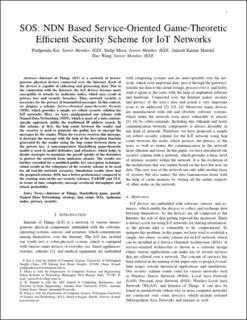| dc.contributor.author | Kar, Pushpendu | |
| dc.contributor.author | Misra, Sudip | |
| dc.contributor.author | Mandal, Ankush Kumar | |
| dc.contributor.author | Wang, Hao | |
| dc.date.accessioned | 2021-09-16T14:57:10Z | |
| dc.date.available | 2021-09-16T14:57:10Z | |
| dc.date.created | 2021-09-05T09:55:05Z | |
| dc.date.issued | 2021 | |
| dc.identifier.citation | IEEE Transactions on Network and Service Management. 2021, . | en_US |
| dc.identifier.issn | 1932-4537 | |
| dc.identifier.uri | https://hdl.handle.net/11250/2778695 | |
| dc.description.abstract | Internet of Things (IoT) is a network of heterogeneous physical devices connected over the Internet. Each of the devices is capable of collecting and processing data. Due to the connection with the Internet, the IoT devices become more susceptible to attacks by malicious nodes, which may result in privacy loss and security breaches. Thus, network security is necessary for the privacy of transmitted messages. In this context, we propose a scheme, Service-Oriented game-theoretic Security (SOS), which provides a simple yet robust security solution for IoT networks. Here, we have amalgamated our scheme with Named Data Networking (NDN), which is more of a data content-specific approach, unlike the traditional IP address search. In this scheme, at first, the hop count between the sender and the receiver is used to generate the public key to encrypt the messages by the sender. When the receiver receives this message, it decrypts the message with the help of the decryption function generated by the sender using the hop count between them as the private key. A non-cooperative Stackelberg game-theoretic model is used to model defenders and attackers, which helps to decide strategies to maximize the payoff (profit) of the defenders to protect the network from malicious attacks. The results are further extended for a modified public key encryption technique, which results in the robustness of the security scheme to be used for all real-life network scenarios. Simulation results show that the proposed scheme, SOS, has a better performance compared to the existing state-of-the-art security schemes, UAKMP and CLS, in terms of time complexity, message overhead, throughput, and attack probability. | en_US |
| dc.language.iso | eng | en_US |
| dc.publisher | Institute of Electrical and Electronics Engineers (IEEE) | en_US |
| dc.title | SOS: NDN Based Service-Oriented Game-Theoretic Efficient Security Scheme for IoT Networks | en_US |
| dc.type | Peer reviewed | en_US |
| dc.type | Journal article | en_US |
| dc.description.version | acceptedVersion | en_US |
| dc.source.pagenumber | 12 | en_US |
| dc.source.journal | IEEE Transactions on Network and Service Management | en_US |
| dc.identifier.doi | 10.1109/TNSM.2021.3077632 | |
| dc.identifier.cristin | 1931381 | |
| dc.description.localcode | © 2020 IEEE. Personal use of this material is permitted. Permission from IEEE must be obtained for all other uses, in any current or future media, including reprinting/republishing this material for advertising or promotional purposes, creating new collective works, for resale or redistribution to servers or lists, or reuse of any copyrighted component of this work in other works. | en_US |
| cristin.ispublished | true | |
| cristin.fulltext | postprint | |
| cristin.qualitycode | 1 | |
